-
Featured Items
-
Featured Resources
 Funding & Grants
Don't miss out on funding opportunities. Stay informed with our up to date online listings and email notifications.
Read More
Funding & Grants
Don't miss out on funding opportunities. Stay informed with our up to date online listings and email notifications.
Read More
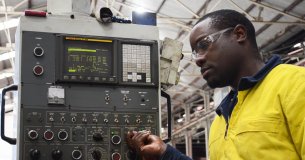 Skilled Migration
Our services help both applicants and employers, to learn more, develop plans, submit applications, and settle in.
Read More
Skilled Migration
Our services help both applicants and employers, to learn more, develop plans, submit applications, and settle in.
Read More
 Research and Analysis
Good research and analysis makes the case. How can our resources and services help your project or application?
Read More
Research and Analysis
Good research and analysis makes the case. How can our resources and services help your project or application?
Read More
 Information & Data Resources
With resources like REMPLAN, Regional Knowledge Base, and decades of data, discover how we can help your project.
Read More
Information & Data Resources
With resources like REMPLAN, Regional Knowledge Base, and decades of data, discover how we can help your project.
Read More
-
Stay InformedSubscribe to one or more of our regular email subscriptions, to be kept up to date on news and funding opportunities for the region
-
-
Our Region
- Our Region
- Regional Plan
- Regional Data
- Current Regional Issues
- Population Migration Analysis for 2016-21
- Job Vacancies Continue at All-Time High
- National Debt - What it Means for Our Economy?
- The True Value of Home Solar
- The Economic Impacts of Local Government Amalgamations
- State of the Regions Report 2014-15
- Antifragility - A different take on regional economic development
- Biohubs - Collaborative Waste Management
- Attracting New Residents
- Socio-Economic Impacts of the Murray Darling Basin Plan
- Murray Darling Basin Water Recovery
- Growing Businesses
- The Northern Inland Economy
- Geographical Overview
- Major Industry Sections
- Our Services
- Grants and Funding
-
Skilled Migration
- Skilled Migration
- Skilled Employer Sponsored Regional Visa
- Skilled Work Regional Visa (subclass 491)
- Temporary Seasonal Workers
- Designated Area Migration Agreement (DAMA)
- Helpful Information for Visa Holders
- Information for Employers
- Case Studies
- Payment Details
- Advice & Further Information
- Contact Details
- News & Events
-
Our Projects
- Our Projects
- Current Projects
- Skilled Migration
- Wool Works - Wool Training Schools
- Metal Works - Welding and Fabrication Schools
- Come On Inland
- Stories of Resilience
- Alt Brothers Beekeeping - Glen Innes
- Carelle's Toy Store - Glen Innes
- Greenhill Orchards - Arding
- Gwydir Meats - Warialda
- Kaputar Motors - Narrabri
- Moonbi General Store - Moonbi
- Sandstock - Tingha
- Sherelle Fashions - Tenterfield
- Sleepy Merino - Inverell
- Tenterfield Chamber of Toursim, Industry and Business - Tenterfeild
- The Welders Dog - Armidale
- Walcha Veterinary Supplies - Walcha
- AGCAP - Agribusiness Careers & Professions
- Northern Inland Regional Investment Profile
- Past Projects
- Digital Economy Strategy
- Business Growth Project
- Go Digital
- How to Start an Online Business
- Create Your Website Using Squarespace
- How to Edit Your Squarespace Site - Part 1
- How to Edit Your Squarespace Site Part 2
- Add a Shop to Your Squarespace Site
- Start a Blog and Find out What Customers are Searching
- 14 Tips For a Better Blog Post
- Which Social Media Platforms are Best for Your Business
- How to Use Facebook Effectively For Your Business – Part 1
- How to Use Facebook Effectively For Your Business – Part 2
- Instagram Tips for Business
- Catching Up, More Instagram & Dealing with Haters
- Getting Started with Twitter for Business
- Social Media Scheduling Tools
- How to Start an Etsy Shop – Part 1 – Research
- How to Start an Etsy Shop – Part 2 – Signup
- Online Security for Your Business
- Product Photography and Website Images: Your Guide
- 5 Tips to Improve your Productivity in your Business
- Best Online Business Resources
- How to Improve Your Communication Skills and Win More Clients
- NBN Coordinator
- Putting Power Back in the Regions
- Road Freight Study
- Town Audit Benchmarks
- Food and Wine
- Youth Survey
- Digital TV Switchover Assistance
- Northern Inland Transport Guide
- Live.Train.Work
- Northern Inland Innovation Awards
- Northern Inland Innovation Awards - 2017
- Northern Inland Innovation Awards - 2016
- Northern Inland Innovation Awards - 2015
- Northern Inland Innovation Awards - 2014
- Northern Inland Innovation Awards - 2013
- Northern Inland Innovation Awards - 2012
- Norther Inland Innovation Awards - 2011
- Prime Super Northern Inland Innovation Awards - 2010
- Prime Super Northern Inland Innovation Awards - 2009
- Northern Inland Innovation Awards - 2007
- Northern Lights Project
- NBN Smart Home
- Murray Darling Basin
- Moree Plains Business Workshops
- Namoi Investment Prospectus
- Industrial Land
- Bioenergy and Local Electricity Retailing
- Northern Inland Business Energy Assessment
- Skills for the Future
- Impacts of COVID-19 on Businesses
- Past Projects of NIRDB
- Aboriginal Employment and Enterprise in the Gunnedah Region
- Art as an Industry
- Aviation Survey
- Farm Forestry - Northern Inland Forestry Investment Group
- New England North West Film Strategy
- Northern Inland Excellence in Business Awards
- Food and Wine 2003 - 2008
- Prime Super Northern Inland Innovation Awards 2009
- Regional Business Networking Program
- Regional Leadership Course 2008
- Viticulture Strategy 2002-2003
- About Us
- Contact Us
- Other Resources
- Privacy and Legal
- Search
Back to Newsletters
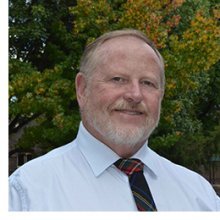
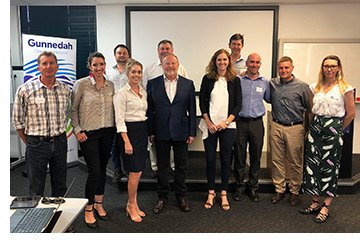
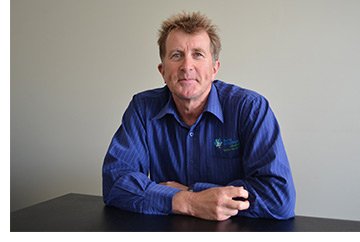
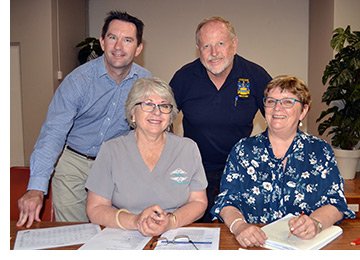
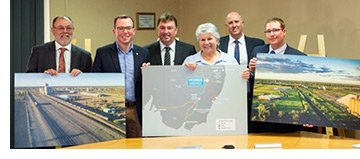
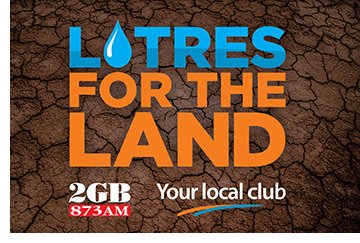
December 2019 Newsletter
Thursday 19th of December 2019
In this Issue
- Merry Christmas from the Chair
- Uniting Councils on Economic Development
- Financially Parched Businesses Calling for Support
- Skilled Migration Explained to Narrabri Business Chamber
- Take a Moment to Ask
- Innovative New Business Hub for Moree
- Give Water and Hope
- Featured Grants and Funding Opportunities
- What's On in the Northern Inland
Merry Christmas from the Chair

Dear Northern Inlanders,
Welcome to the December edition of our newsletter.
I am certain the years continue to get shorter, and before we know it another year has passed. This year has been a tough one for our communities due to the devastation of the drought on farming and non-farming businesses and families alike, as well as the damaging fires that have also impacted our communities. As our communities rally together in these hard times, Christmas provides us with a great opportunity to check-in with those around us and make sure they are okay. Below are details on where you can find information on how you can help those around you that are struggling.
I am proud to say that through our unique expertise and experience we have contributed to the attraction of over $30 million in funding to the Northern Inland in the last 18 months by working closely with the Councils in our region. After the great success of our inaugural Economic Development Forum in Gunnedah, we are looking forward to continuing to work with all the Councils in our region by establishing quarterly forums in the coming year.
I wish all our readers a very merry Christmas and a wonderful new year. Although many of us may not have as many presents under the tree this year, it is those that are around it that matter the most.
Please note that our office will be closed from 5pm on Friday the 20th of December and will re-open on Monday the 6th of January.
Regards,
Russell Stewart
Chair
Uniting Councils on Economic Development

Our Local Councils face many barriers as they work to foster economic growth, but they are not working in isolation. To highlight this, last month we ran our inaugural Economic Development forum in Gunnedah, which brought several economic development specialists together from Local Councils around the region. The workshop was attended by Economic Development Managers from Gunnedah, Glen Innes, Moree Plains, Liverpool Plains and Armidale Regional Councils and AusIndustry. The participants found the forum extremely worthwhile, and the group decided to run the workshops quarterly. The feedback received highlighted that this is the start of something that will be positive for the region.
The workshops aim to facilitate the exchange of information on our latest projects, grant and funding opportunities, as well as discuss best practice and the barriers to economic development efforts in our Local Councils. Council representatives were also keen to discuss successful projects that may work elsewhere, as well as joint projects. Our Local Government Areas are interconnected, and a big-picture regional approach can provide a benefit to our region as a whole. The forum facilitated collaboration, partnerships and efficiencies across Council boundaries which the Federal and State Governments are supportive of, which in turn provides greater funding opportunities. With many councils being required to provide more infrastructure and services on limited funds, although economic development staff may know how to drive economic growth within their communities, they often face financial restraints, and rely on ad-hoc project grants.
Over the past 18 months we have contributed to the attraction of over $30 million in funding to this region by assisting most Northern Inland Councils with the business cases, cost-benefit analyses and economic data for grant applications. At the forum we provided insights in Government programs and grant funding opportunities that are available to our Local Councils and made them aware of how they can use our services to better their prospects for projects that can benefit their respective communities. We also outlined job growth stimulating private sector grants.
All economic development managers from the twelve Local Government Areas that make up the Northern Inland are invited to the forums, with the next one to be held early next year. For further information, contact our office at rdani@rdani.org.au or on 6771 0700.
Financially Parched Businesses Calling for Support

As they struggle to cope with the impacts of the worst NSW drought in memory, non-farm businesses are increasingly frustrated with their inability to access the type of government support that farmers can, according to our Senior Research Economist, David Thompson.
Our survey of non-farm businesses has revealed significant negative impacts on business turnover and employment levels. Such is the desire of business people to have their voices heard that a total of over 450 non-farm businesses have participated. Initial analysis has drawn out pertinent figures and conclusions. The survey has shown that 58% of the region’s non-farm businesses are reporting a turnover reduction in the range of 11-50%, and 15% report a reduction of 51-75%. Non-farming businesses are calling for practical support and some great, sometime heart-wrenching insights have come in and should help to educate our political representatives.
Sales reductions clearly have a negative impact on business profitability and sustainability. Some businesses are reporting they are having to close their doors or put the business into hibernation in an attempt to minimise their costs as they simply don’t have the cashflow to continue trading and meeting daily operating expenses.
Businesses were asked what they had been doing to cope with the extended drought. Common strategies included reducing operating costs (75% of businesses), reducing personal expenditure (67%), reducing staff costs (49%) and delaying payments to suppliers (35%). All of these actions are likely to have negative flow-on effects to other local businesses in the region. Also of concern is that 45% of businesses have taken on additional debt or refinanced existing debt in order to survive.
When asked what actions the three tiers of government could take to assist their businesses through the drought, council rate reductions (52% of businesses) and zero interest loans from governments (49%) featured strongly, as did access to the same household payments and other support to which farm businesses are eligible (46%).
Many non-farm businesses commented that their inability to access the type of support which farmers can receive was inequitable, particularly for businesses that relied almost entirely on the farming sector such as machinery suppliers, stock and station agents and rural produce stores.
An issue to feature strongly is the need for business assistance to retain qualified staff. Several businesses noted that staff who were laid off either went straight onto welfare payments or left the district to look for work. Both these actions only further exacerbate the negative impact of the drought on the local economy. Business owners felt a much better approach than having staff leave and/or go onto unemployment benefits was for governments to pay that (welfare) money to businesses as a wage subsidy so that skilled labour could be retained in the region and in the business. Being able to keep quality staff would also speed business and economic recovery once the drought ends, as business activity could be ramped back up more quickly without the need to recruit and re-train new staff.
The impact of taxation on business cashflow has also emerged as a major hurdle for businesses dealing with the drought. Making quarterly GST and income tax payments (PAYG) in particular was a problem for many, who suggested these payments should be deferred in severe droughts until conditions and cashflow improve. More general regional income taxation relief was also sought, along the lines of the previous debates on zonal taxation areas, with lower income tax rates for those in drought affected areas. The capacity to tap into superannuation accounts during times of severe drought has been mentioned, as has the provision of vouchers or gift cards to local residents which must be spent within the local area to help support business cash-flow. If Local Councils wish to use drought funding to stimulate their local economy, then our survey can show the Federal Government that this is an option that local businesses support.
The full analysis of the information provided by businesses will be completed early next year.
Skilled Migration Explained to Narrabri Business Chamber

Despite the ongoing economic struggle caused by the drought, skill shortages continue to impact on our region, from the hospitality to health sectors, impeding economic growth and service delivery. Senior Skilled Migration & Project Officer, Gary Fry travelled to Narrabri to speak to the Narrabri and District Chamber of Commerce to explain how skilled Migration is an important way in which we are upskilling our region and how employers can access skilled migrants.
Mr. Fry explained the retention benefit of the new Skilled Employer Sponsored Regional visa program sub-class 494. Retention of good staff can be as big a challenge as attraction and the new regional employer sponsored visa addresses that. The 494 visa is a Permanent Residency pathway and to be eligible for the 191 PR visa, sponsored skilled migrants will need to work for the sponsoring employer for three years. It is a priority visa program for the Australian Government, which commenced on 16 November and replaced the Regional Sponsored Migration Scheme which was a direct entry PR visa.
The Narrabri Business Chamber was also briefed on the regional state sponsored 489 visa program. These visa recipients applied to this region for State nomination if they met the requirements for an occupation on our regional list, which covered a broad range of in-demand occupations such as registered nurses, chefs and metal trades. They need to live and work regionally for two years in order to be eligible for Permanent Residency. As they do not receive welfare or Medicare, getting employment quickly when they come to the region is a high priority for them.
RDANI established the Skilled Migration Jobs Board Northern Inland Facebook group as an online service for skilled migrants in or coming to the region and employers to connect. This online resource is a successful initiative, with 664 members. It is an engagement tool that has achieved numerous employment outcomes. Skilled migrants who are settled in the region with a job continue to monitor the Group and help with employment advice for newcomers. Mr. Fry encouraged the Narrabri Chamber of Commerce members to join that group and was delighted to see one of the progressive members do so immediately.
Take a Moment to Ask
The severity and duration of the drought, and the many bushfires so early in the season is taking its toll on farmers, business owners, firefighters and everyone in our communities. The Christmas and new year season, and the many associated get-togethers, provides an ideal opportunity to ask those around us how they are going and if they are okay.
The story of Lucy Gallagher is one that is shared by many. Lucy lives on a property near Halls Creek, and her story about reaching out for help went viral on social media and captured national media attention, including The Project. After battling the drought and making the best of a hard situation, Lucy broke down and reached out to Beyond Blue. Lucy’s story highlights the need to not only look after those around us but ourselves as well and that there is no shame in reaching out, it is just part of being human. “Look after yourself, first and foremost. You owe yourself the time and love that you willingly and freely give to others. You can’t pour from an empty cup, and you can’t feed from an empty bucket.” She said.
If you are struggling and need someone to talk to, mental health support is available 24 hours a day via Beyond Blue (1300 22 46 36) and Lifeline (13 11 14). Beyond Blue also have a comprehensive listing of assistance lines and support groups on their website. You are not alone.
Many small business owners are also struggling, and advisers, families and friends because they were often the first to notice when small business owners experience mental health challenges. Beyond Blue has developed the Supporting small business owners to improve their mental health and wellbeing at work guide to provide business advisers such as accountants, bookkeepers, tax agents, industry associations and representative bodies, or family and friends, with practical tips about how to provide support without needing to be trained counsellors or clinicians.
The guide includes information such as:
- How to provide immediate support to a small business owner who is distressed
- Recognising the signs of poor mental health
- Planning and having a conversation with someone you’re concerned about
- What to do if the person doesn’t want to talk about their mental health
- How small business owners can improve their situation
Small businesses owners can also obtain assistance through the Ahead For Business website. The website connects small business owners with information, programs and interventions that can help with planning, managing everyday business stressors and taking action for mental health challenges. Business owners can get tailored recommendations about useful information and programs by completing the 2-minute Business stressor screen and the 5-minute Mental Health 'Check-Up'.
Innovative New Business Hub for Moree

An innovative new business hub, specialising in agribusiness, logistics and food processing industries is set to be established in Moree and will create almost 2,000 jobs. When the precinct is operational, Moree will become the third Special Activation Precinct (SAP) in New South Wales, following Parkes and Wagga Wagga, marking the dawning of a new era for north-western NSW.
“Moree is on the Inland Rail route and is located at the junction of three major highways making it the ideal location for this new endeavour to attract considerable new investment to the region” said Northern Tablelands MP Adam Marshall. “A Special Activation Precinct is a designated area which brings together fast-tracked planning, infrastructure investment, government-led studies and development and in Moree’s case will happen in line with its plans for an intermodal freight and transport hub. The SAP will make it easier for new and existing businesses to expand, set-up and thrive, create new, long-term job opportunities for locals and strengthen the region’s economy.”
“Moree is a regional centre which relies on the agriculture sector for survival and while the local economy has taken a hit because of the prolonged drought, this announcement should give struggling local businesses confidence they have future when the rains and harvests return. This is the beginning of the largest transformation of Moree since Copeton Dam was constructed and the irrigation industry came to the region in the 1970s – it will mean more jobs and more opportunity for our children and grandchildren.”
The announcement was welcomed by Moree Plains Shire Mayor Katrina Humphries. “A Special Activation Precinct in Moree will help to realise the opportunities presented by the Inland Rail, and other projects in the region,” Cr Humphries said. “It will create a world-class business hub that will not only attract investors to the region, but also help to keep families here for the long-term. This is about creating a legacy for generations to come and helping to diversify income streams in our regions to build even more resilience against future droughts.”
Mr Marshall added the SAP was also a chance to create more jobs and opportunities for the local Aboriginal community. “The Aboriginal community represents approximately 21 percent of people living in the Moree Plains Shire and will be closely consulted with during the planning phase,” he said. “Today we are meeting on Kamilaroi land, and our ambition is to work alongside this community to deliver critical social outcomes, as well as important economic benefits like sustainable jobs for local people into the future.”
Businesses that set themselves up in the Special Activation Precinct will have access to necessary infrastructure, such as heavy-duty roads and digital connectivity, as well as a fast-tracked planning process and support through a business concierge service. Moree is set to become a world-class business precinct and true intermodal hub with road, rail and air transport links available, meaning local businesses can potentially increase their customer base globally.
Visit www.nsw.gov.au/MoreeSAP for more information.
Give Water and Hope

Litres for the land is a new charity that has been established by Team Rubicon Australia, Your Local Club and 2GB to provide water, and in turn hope.
Through club fundraising activities and public donations, millions of litres of water will be purchased and transported to the bush and provided for free to farms and families that need it the most. Sourcing of water will be dependent upon the location. In many areas, water will be purchased from the council through local water carters. However, in areas where there are tight water restrictions the water will be sourced from outside of the local government area and trucked in. Team Rubicon Australia, which is made up of Australian Defence Force Veterans who specialise in disaster relief, will be assessing, prioritising and providing the water on an as-needed basis.
You can nominate a farm or family to receive water or donate to the project through the Litres For The Land page on the Clubs NSW website.
Featured Grants and Funding Opportunities
Below are some featured grants and funding opportunities from the multitude of open grants listed in the Grants and Funding Opportunities area of our website. Our website is updated weekly with new listings and updates and all are applicable to our region, so it is a great resource if you are looking for funding for a specific project.
You can also sign up to our Business and Infrastructure Funding Opportunities and the Community Grants and Award Programs newsletters through the simple form located on the left-hand side of our website: www.rdani.org.au, to receive monthly summaries of currently open grants.
Disaster Recovery Grants
Closes: 24th of May 2020
Value: $10,000 to $100,000
Run By: NSW Government Rural Assistance Authority
The Natural Disaster Recovery Relief Grant is available to eligible primary producers, small businesses, sporting clubs and not for profit organisations, following the declaration of a Natural Disaster by the NSW Government, and following the approval of the Australian Government. This assistance measure is only provided in event of Natural Disasters that have severely affected communities, regions or sectors.
There are funds available for:
• Primary Producers
• Small Business
• Not-for-Profit Organisations
Tackling Tough Times Together
Current Round Closes: 25th of February 2020
Value: Up to $150,000 depending on the tier applied for
Run By: Foundation for Rural and Regional Renewal
The Tackling Tough Times Together grant program helps communities access the resources they need to support one another through the ongoing effects of the drought.
This program is designed to provide flexible funding to support community-based activities that both help to relieve current stressors and symptoms, and most importantly, build capacity and resilience for the future. Funds could also support activities that engage your local community in being proactive, exploring options and creating something that will stand the test of tough times.
Community Futures Grant
Closes: 2nd of February 2020
Value: $25,000
Run By: Royal Agricultural Society of NSW
Provides an opportunity for community-minded people to be awarded up to $25,000 in funding for a community project in their local area. The RASF invites ideas that deliver strong community benefits and result in enhanced economic and social outcomes for your community. Projects that involve collaboration between people in your town and deliver sustained and broad community benefits will be highly regarded. Applicants will be passionate about rural and regional NSW, and have a good understanding of any issues affecting their community.
Infrastructure for local showgrounds and Show Societies are eligible. The improvements must demonstrate that they go beyond benefiting just the local Show Society in running the local Show, but rather enabling broader use by other community groups to run on-going projects or programs.
In the past this grant has carried an age limit of 35 years. This age limit has now been lifted, however the RAS Foundation remains committed to fostering youth leadership and will earmark a portion of the available grant funding to projects driven by young people.
What's On in the Northern Inland
Christmas in Moree: Late Night Shopping
Thursday 19th of December
Moree
Maitland Street Christmas Fair
Thursday 19th of December
Narrabri
Boggabri Swimming Pool Outdoor Movie Night
Friday 20th of December
Boggabri
Anglican Church Christmas Carols
Friday 20th of December
Narrabri
Social Evening
Friday 20th of December
Wollomombi
Rotary Twilight Christmas Markets
Saturday 21st of December
Tenterfield
Salvo's Christmas Outdoor Movie Night
Saturday 21st of December
Tamworth
Skool's Out Pool Party
Saturday 21st of December
Armidale
Crossing Theatre Annual Christmas Carols
Saturday 21st of December
Narrabri
Combined Churches Carols in the Park
Saturday 21st of December
Inverell
Shopping Frenzy Weekend
Saturday 21st to Sunday 22nd of December
Inverell
Live Dream Dance Family Fun Day
Sunday 22nd of December
Tenterfield
Anglican Church Christmas Carols
Sunday 22nd of December
Bellata
Boxing Day Picnic
Thursday 26th of December
Tenterfield
Guyra Pool 50th Anniversary
Friday 3rd of January
Guyra
Eat Street Tenterfield
Friday 3rd of January
Tenterfield
Nowendoc Music Festival
Saturday 11th of January
Nowendoc
Guyra Lamb and Potato Festival
Wednesday 15th to Monday 27th of January 2020
Guyra
Country Music Festival
Friday 17th to Thursday 26th of January
Tamworth
Movie Night under the Stars
Friday 24th of January
Walcha
Related Pages







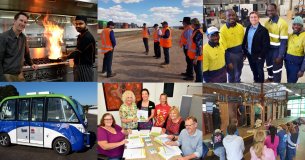 Latest News
Latest News
